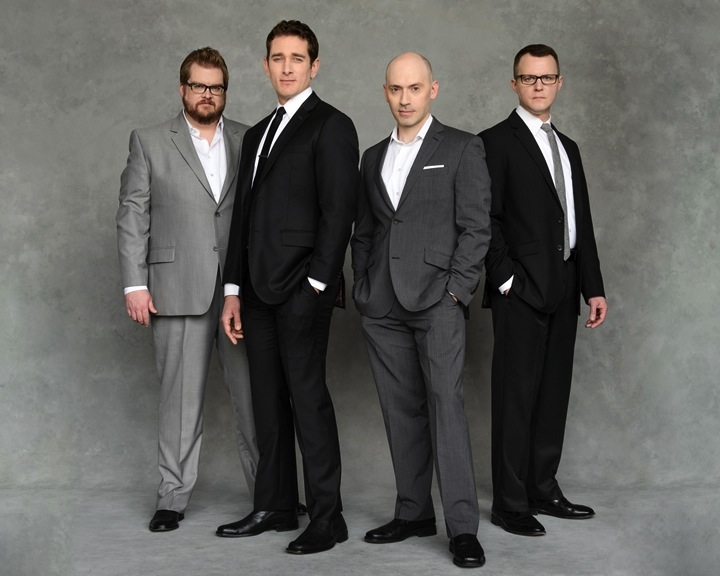After basking in the glories of their latest album, Times go by Turns, it’s clear that New York Polyphony has cemented a place as the a cappella classical vocal quartet of the moment.
- Classical Music 101: What Does A Conductor Do? - June 17, 2019
- Classical Music 101 | What Does Period Instrument Mean? - May 6, 2019
- CLASSICAL MUSIC 101 | What Does It Mean To Be In Tune? - April 23, 2019
Countertenor Geoffrey Williams, tenor Steven Caldicott Wilson, baritone Christopher Dylan Herbert and bass Craig Phillips have mastered the delicate art of singing pre-18th century music — while also being conscious of drawing clear lines to the 21st century.
In their new album, released on the BIS label, New York Polyphony has focused on a mix of masterpieces and lesser-known sacred works from 16th century England, a place deeply disturbed by the tug of war between Tudor Protestantism and traditional Roman Catholicism.
This period marks the height of polyphony, where three or more voices sing independent musical lines to create rich vocal tapestries. It also marks the beginning of a more straightforward, metrical style of music favoured by the Protestants.
The two masterworks on the album are Masses for Four Voices by William Byrd (1540-1623), who received special dispensation from Elizabeth I to write music suitable for Roman worship, and Thomas Tallis (1505-85), a master operator who survived the shifting tastes, politics and caprices of royal chapels under four monarchs.
The New Yorkers follow the best tradition in singing this music, achieving an absolutely equal balance between the four voices and singing without dynamics. (Few people not intimate with this music realise that the crescendos and decrescendos are contained within the writing itself, not in the singers raising or lowering the volume of their voices.)
 The Aha! discovery on this album is a Mass setting by John Plummer (1410-83), whose life’s work was largely destroyed when King Henry VIII ordered the dissolution (and, often, destruction) of his kingdom’s Roman Catholic institutions. The music we get here is a rich blend of Medieval and Renaissance, balancing both a plainchant-like spareness and richer polyphony.
The Aha! discovery on this album is a Mass setting by John Plummer (1410-83), whose life’s work was largely destroyed when King Henry VIII ordered the dissolution (and, often, destruction) of his kingdom’s Roman Catholic institutions. The music we get here is a rich blend of Medieval and Renaissance, balancing both a plainchant-like spareness and richer polyphony.
New York Polyphony always adds something newly composed to their programming.
On this disc, they have included the beautifully serene A Colloquy With God, based on a poem by 17th century poet Thomas Browne. It was a gift to the ensemble by the British composer Richard Rodney Bennett shortly before he died last Christmas Eve. He had been inspired by hearing them in concert.
The album closes with what can only be described as an elaborate vocal fanfare, written to deliberately echo the great polyphonists: Ite Missa est (The Mass is Ended) by another British composer, Gabriel Jackson.
Beauty, texture and variety are all present here. I can’t think of a better introduction to the vocal glories of the English Renaissance.
You’ll find all the details here.
Last month, National Public Radio posted a beautiful music video by Mark DeChiazza based on New York Polyphony’s recording of Bennett’s A Colloquy:
John Terauds
- Classical Music 101: What Does A Conductor Do? - June 17, 2019
- Classical Music 101 | What Does Period Instrument Mean? - May 6, 2019
- CLASSICAL MUSIC 101 | What Does It Mean To Be In Tune? - April 23, 2019




